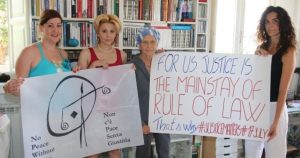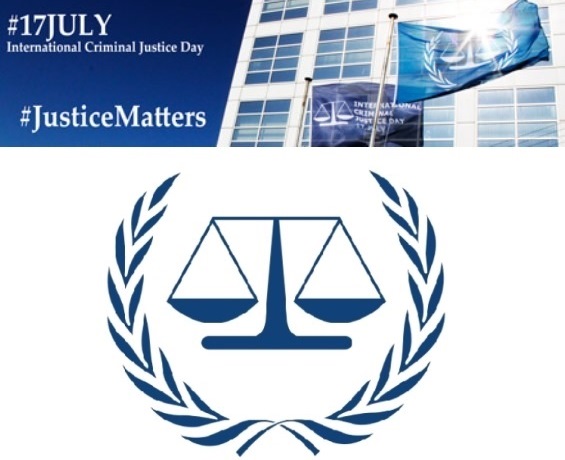Today, 17 July, is International Justice Day: after years of campaigning by No Peace Without Justice (NPWJ) and others, this date was adopted by the Assembly of States Parties to the International Criminal Court (ICC) during the first Review Conference of the Rome Statute held in Kampala, Uganda, in June 2010. International Justice Day marks the anniversary of the adoption by 120 States in 1998 of the Rome Statute, the founding treaty of the ICC, which entered into force on 1 July 2002.

Statement by Alison Smith, Legal Counsel of No Peace Without Justice:
“For more than a decade, No Peace Without Justice and the Nonviolent Radical Party, Transnational and Transparty (NRPTT) have celebrated International Justice Day as an important milestone in the history of the world, particularly for the victims of crimes under international law. On this day, on which the ICC was born through the adoption of its Statute in 1998, we commemorate this moment with our partners and with everyone involved with the fight against impunity, including the ICC itself.
“Today is a moment for reflection, to consider the impact of international justice efforts on victims and on populations that have suffered conflict and periods of intense political violence. Sadly, in the past year, the challenges seem to outweigh the achievements; without a shift within the international community to prioritise justice and redress, it seems the year ahead may be beset with the same or similar challenges. As we said last year, for there to be real progress in the fight against impunity, two things need to happen. First, States need to take every opportunity to publicly reaffirm their commitment against any attempt to embrace impunity, wherever it threatens to occur, then they need to stand by those words and make accountability happen. Second, and equally important, the victims and populations that have suffered directly and indirectly from crimes under international law need to be front and centre in the justice process: they are not an “add-on” or a luxury, they are the very reason why we fight impunity at all.
“The fighting in Syria – and the deliberate targeting of civilians – passed its fourth anniversary in March. This is the fifth year since the conflict began in 2011 that the world has failed to end the appalling suffering that disproportionately affects civilians, particularly women and children. Despite lofty words, the international community has failed to prioritise accountability and failed to harness the possibilities it heralds to help bring a peaceful, political settlement to the conflict. If anything, in the past year, the people of Syria have faced even greater threats, with the emergence of ISIS on Syrian territory, further crushing civilians with ever-increasing brutality and leaving them less space to live their lives and less possibility for the new generation of Syrians to grow up in a peaceful world that guarantees their rights. Those members of the international community that continue to block accountability should hang their heads in shame and take a moment to consider the suffering that their actions allow to continue with impunity.
“This year has continued to demonstrate that a lack of follow-through with financial commitments is putting international criminal justice and the promises it has for victims and affected communities at risk. A prime example of this is the Residual Special Court for Sierra Leone, which was established to maintain the investment of the international community and anchor and preserve the legacy of the SCSL in Sierra Leone, Liberia and beyond. The RSCSL is facing the same challenges that the Special Court faced finding donors to support its work; the risks of failure are also the same: a collapse of the Residual Special Court would signal that justice and accountability are not real priorities of the international community, which would embolden perpetrators the world over. We strongly urge the international community, and particularly States who have been supportive of Sierra Leone over the years, to ensure that the Residual Special Court for Sierra Leone, which has taken over from the SCSL, has the modest funding it needs to fulfil these essential functions. This is the only way it can ensure the legacy of the Special Court is not lost to Sierra Leone, the region and the world.
“At the International Criminal Court, two significant events over the past year – the dropping of the case against Uhuru Kenyatta and the transfer of Dominic Ongwen to The Hague –demonstrate that the policies of the past have cast a long shadow over the institution’s ability to effect real justice. For this reason, we are heartened by the reconceptualisation at the ICC of the work of two of its main organs, the Office of the Prosecutor and the Registry. In particular, the ReVision project initiated by the Registrar to restructure the operations of the Registry in a more streamlined, field-oriented way is to be applauded. We recognise challenges within that process, in particular how a new structure and approach will protect the rights of victims and defendants, but overall it was clear that there was a need to revamp the institution and to reorient it towards delivering justice for victims and affected communities. We encourage all actors to support the ICC in implementing these changes and to help it become a real beacon of hope for those who need that hope to continue fighting for peace and justice all around the world.
“In the meantime, it continues to be of critical important for all States Parties to fulfil their obligations under the Rome Statute and cooperate fully with the ICC, notably by ensuring as a matter of priority the enforcement of all its outstanding arrest warrants. We cannot – and must not – forget that there are still numerous fugitives from justice: their prompt arrest and transfer to face trial is the least that their victims deserve. Countries must not allow their territory to become a safe haven in which alleged war criminals may hide, no matter their position in their State of origin. As is recognised in customary international law and the Rome Statute, there is no immunity when it comes to war crimes, crimes against humanity and genocide.”
For further information, contact Alison Smith on asmith@npwj.org or +32-2-548 39 12 or Nicola Giovannini on ngiovannini@npwj.org or +32-2-548-3915.




